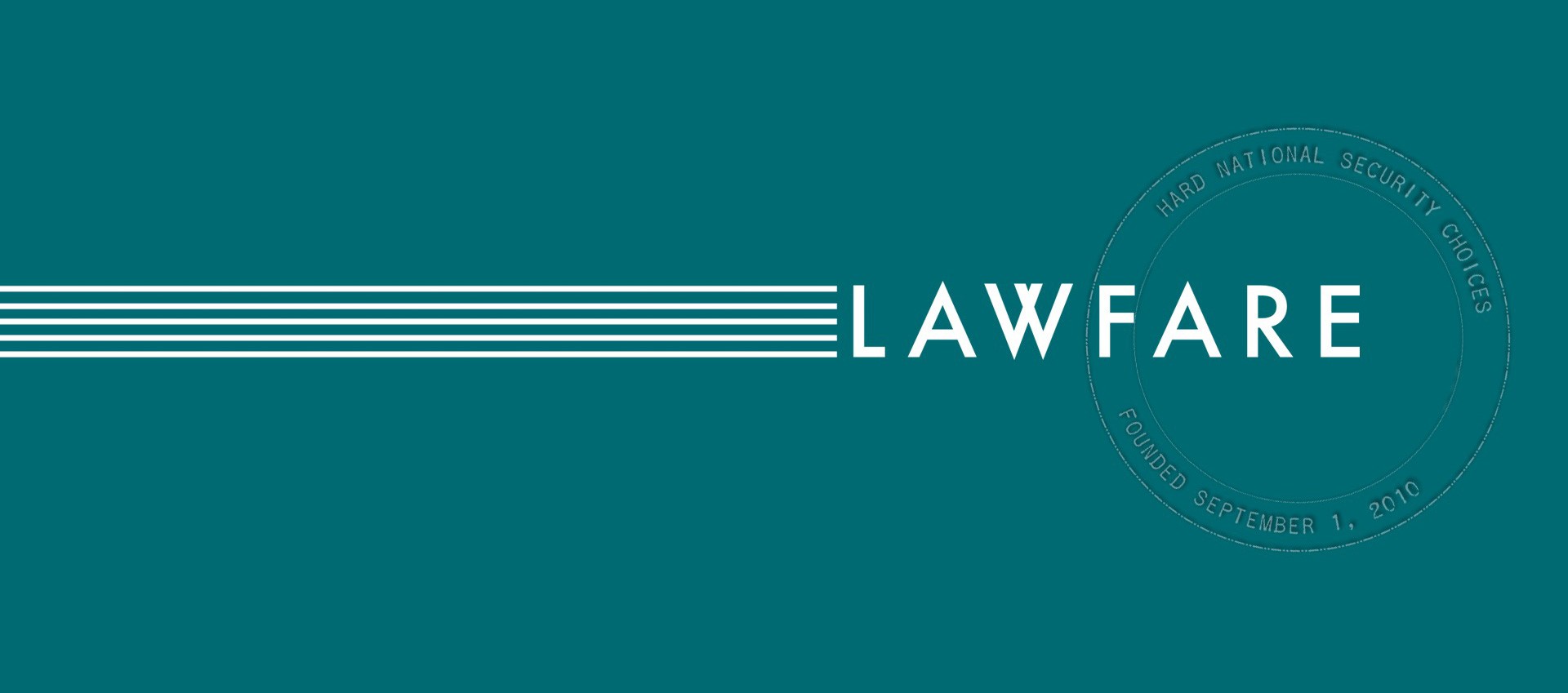The Week That Was: All of Lawfare in One Post

Published by The Lawfare Institute
in Cooperation With

Roger Parloff discussed Judge Aileen Cannon’s Feb. 6 order to unseal the names of prospective witnesses against former President Donald Trump in his Mar-a-Lago trial and why it may be reversed by the Eleventh Circuit.
Kel McClanahan argued that Congress needs to reform the Presidential Records Act to include a “transition process” for identifying classified records of outgoing administration officials.
Marty Lederman explained why the Supreme Court’s decision on Trump’s immunity argument in his Jan. 6 case matters little for his prosecution. Lederman asserted that the court’s ruling only affects a small portion of Special Counsel Jack Smith’s prosecution of Trump, and would not impact the “construction of criminal statutes to burden the Article II authorities of sitting presidents.”
Anna Hickey shared the Supreme Court's order granting Trump’s writ of certiorari in his appeal of the United States Court of Appeals for the D.C. Circuit's rejection of his presidential immunity defense in the Jan. 6 case.
Hyemin Han shared the decision by an Illinois Circuit Judge which determined that Trump is ineligible to be on the Illinois presidential primary ballot for his role in the Jan. 6 attack. Find it also on Lawfare’s Trump Disqualification Tracker.
Natalie Orpett and Katherine Pompilio announced the newest episode of Lawfare's narrative podcast series: The Aftermath, Season 2 Episode 4: “The Hidden Insurrection.” Episode 4 illustrates the Jan. 3, 2021, attempted takeover of the Justice Department and its lasting impact on Jan. 6 prosecutions, department leadership, and institutional integrity:
On Feb. 29, Scott R. Anderson sat down with Benjamin Wittes, Anna Bower, and Parloff for this week’s episode of “Lawfare Live: Trump’s Trials and Tribulations.” If you couldn’t attend the live event, the recording is available on Lawfare’s YouTube channel or over the weekend on the Lawfare Podcast feed:
On Mar. 1 at 6 p.m. ET, Wittes, Parloff, and Bower will discuss today's hearings in Fulton County, Georgia and Florida in the Trump criminal cases. Watch the discussion here. If you can't attend the live event, the recording will be available immediately after on Lawfare’s YouTube channel:
On the Lawfare Podcast, Tyler McBrien sat down with Anderson to talk through Trump’s recent comments about NATO indicating that he would not protect an allied country from a Russian invasion if they didn’t pay their bills. They discussed why the comments are rattling European allies, whether a U.S. president could destroy the alliance, and how Congress might stop it:
Sarthak Bhatnagar, Eli Glickman, Bethany Goldblum, Ritwik Gupta, Kaitlyn Lenkeit, Jane Darby Menton, Andrew Neciuk, Andrew W. Reddie, Vishwaa Sofat, and Leah Walker—in light of recent reporting that Russia is developing nuclear-tipped anti-satellite (ASAT) to launch into space—discussed how these weapons systems could impact the current “weapons in space” regime, the risks posed by ASAT weapons in space, and the international community’s potential, and potential policy responses.
In this week’s installment of Lawfare’s Foreign Policy Essay series, Steven Simon and Jonathan Stevenson discussed the growing threat of transnational terrorism in the wake of Hamas’s Oct. 7 attack and the war in Gaza, and how the United States should respond.
Matthew S. Erie examined the increase of state statutes targeting property ownership by Chinese individuals. He argued that though there are legitimate national security concerns that the statutes try to address, they tend to overreach and show U.S. property law trending towards illiberalism.
Also on the Lawfare Podcast, Anderson and Brandon Van Grack sat down with Brad Smith to discuss how financial sanctions as a tool of U.S. foreign policy could have consequences for both national security and the economy. As a veteran of U.S. sanctions policy, Smith walked through some of the history of sanctions, lessons the Biden administration has learned from past efforts, and more:
Matt Gluck shared President Joe Biden’s fourth letter sent to Congress “consistent with the War Powers Resolution” regarding recent U.S. strikes against Iran-backed militias in Iraq and Syria.
Pompilio shared the Biden Administration’s new executive order restricting access to Americans' bulk sensitive personal data and government-related data by “countries of concern.”
Peter Swire and Samm Sacks analyzed Biden’s executive order limiting the bulk sales of personal data to “countries of concern.”
Gluck also shared the Defense Department’s three-page unclassified summary of a 30-day investigation into Secretary of Defense Lloyd Austin’s recent hospitalization.
Jacob Schulz previewed oral argument heard by the Second Circuit on Feb. 28 in U.S. v. Turkiye Halk Bankasi A.S, a case that will largely determine the scope of criminal foreign sovereign immunity doctrine.
On Rational Security, Quinta Jurecic and Anderson were joined by Molly Reynolds and Bower to talk about the week’s big national security news. They discussed a potential government shutdown due to Congress, a deeper dive into District Attorney Fani Willis and special prosecutor Nathan Wade’s romantic relationship in Fulton County, the oral arguments heard by the Supreme Court in the NetChoice cases over content moderation laws in Florida and Texas, and more:
On the Lawfare Podcast, Wittes sat down with Jurecic, Alan Rozenshtein, and Kyle Langvard to discuss the oral arguments heard by the Supreme Court earlier this week in the NetChoice cases– which challenge laws restricting content moderation in Florida and Texas. They talked about where the justices seem to be leaning on the cases, why they think the record is inadequate, and more:
On the Lawfare Podcast, Stephanie Pell sat down with Justin Sherman to discuss an investigation by Sen.Wyden’s office into the activities of Near Intelligence Inc, a data broker that allegedly enabled an anti-abortion organization to target messaging and ads to people visiting Planned Parenthood clinics. They talked about the various players in the data broker ecosystem that enable these invasive practices, the lack of federal legislation governing and preventing these activities, and more:
Eugenia Lostri and Jurecic discussed the decisions of federal agencies to limit communications with social media companies, and the potential implications of these fading partnerships for the 2024 presidential election and the U.S. cybersecurity strategy.
James Lewis reviewed “No Shortcuts: Why States Struggle to Develop a Military Cyber-Force” by Max Smeets, writing that his book provides a useful framework to address different advancements by nations in cyber warfare, but falls short in having a deeper discussion of the significance of cyber actions.
On the Lawfare Podcast, McBrien sat down with Lauren Kahn to discuss how autonomous and AI-enabled weapons are being used and will be used in war, “the current ground rules for the age of AI in warfare,” why Khan favors confidence-building measures and other incremental steps, rather than an all-out ban, and more:
Bruce Schneier and Josephine Wolff examined the intricacies of creating and implementing a federal cyber insurance backstop to cover financially catastrophic state-sponsored cyberattacks.
In the latest edition of the Seriously Risky Business cybersecurity newsletter, Tom Uren discussed a report published by the U.S. Office of the National Cyber Director on memory safe programming languages, the Nevada Attorney General’s motion to stop Meta from providing end-to-end encryption on the Messenger app for under-18 users, and more.
Reganne Hardy, Lostri, and Sherman shared a collection of resources—including government documents, guidelines, corporate practice, and analysis—that inform the work done for Lawfare's ongoing Security By Design project.
Bob Gleichauf and Dan Geer discussed the potential issues with using digital watermarks to address challenges that arise with Generative AI and large language models (LLMs) and how cybersecurity can provide lessons for regulation.
On Chatter, David Priess sat down with Rebecca Boyle to unpack her new book “Our Moon,” which dives into how the Moon and its tides affect national security. Priess and Boyle also discussed her path to writing about astronomy, Julius Caesar, lunar versus solar calendars, the Battle of Tarawa in 1943, lunar missions and the Cold War, and more:
Amy Gaudion announced that the American Association of Law Schools will host an Early Works in National Security Law Workshop on Apr. 26, 2024, and is accepting submissions for the program.
And Lawfare is now accepting applications for our Summer 2024 internship program. Apply here.
And that was the week that was.

